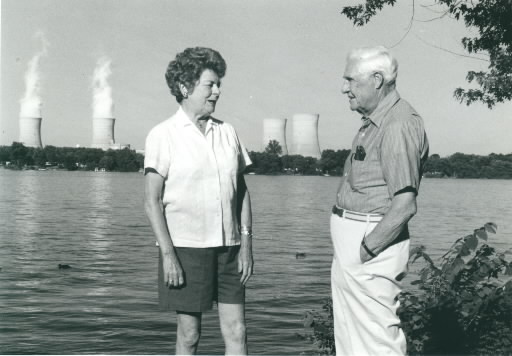2. No Chance of a Quiet Retirement
Jan. 11, 2013
Chapter 1: The United States
Part 2: Three Mile Island--Ten Years After
Part 2: Three Mile Island--Ten Years After
After a tour around the plant we visited some of the local residents. Right in front of us on the opposite bank of the Susquehanna River, we could see the four cooling towers of the nuclear complex. We spoke to local resident Bill Whittock, aged eighty-three, about his feelings toward his imposing neighbors.
"I came close to being killed countless times during the Second World War, but that accident in 1979 made me more scared than I've ever felt before," he told us, gesturing toward the silenced Unit 2 reactor. "I heard a roar like a plane taking off—it was just before dawn, about four o'clock." Whittock had leaped out of bed and been greeted by the sight of two of the four towers opposite belching steam high up into the sky. This stopped after ten minutes, then started again after another five had passed.
"The same kind of thing had happened twice before," Whittock continued. "But not on this scale. It was obvious something had gone drastically wrong." At this stage of events, the staff of Three Mile Island had a real crisis on their hands; there was every possibility that the core might melt and sink into the ground as depicted in the movie The China Syndrome. The condenser pumps and water supply pumps stopped one after the other, leaving the inside of the reactor to boil dry, as it were, and the temperature was rising rapidly.
Whittock had an odd metallic taste in his mouth, unlike anything he had ever tasted before. His wife, Irene, was in Alaska at the time visiting her family. Three days later the state government issued an evacuation order and Whittock left town carrying the couple's two cats. He saw the familiar cooling towers on television at the home of a friend and was shocked to hear the announcer describing the complex as the scene of the world's first major accident involving nuclear power.
After the accident, five years passed without incident for the Whittocks, although they never stopped feeling uneasy about the possibility of being exposed to radiation. Then in 1986, Bill found a growth on his neck. On his doctor's advice he had a thorough examination at the Temple University Hospital in Philadelphia; he was told he had skin cancer. A piece of skin about an inch square was removed from his neck immediately.
"No doctor could tell me if it was caused by the accident or not. But there's no doubt that radiation would have been released with the steam that came out of there. You can see why I can't help thinking that my illness has something to do with that accident, can't you?" Whittock added that the elderly couple two doors down were also suffering from cancer; the husband had cancer of the pancreas and the wife breast cancer.
"We moved here twenty years ago because we wanted to spend our retirement quietly in the country. Of course there wasn't a nuclear power plant here then." Five years later two ugly concrete towers went up in front of their house. The Unit 2 reactor was built, and the view from their garden was completely blocked. The local residents were told that once the plant was up and running, their power bills would be next to nothing. "So we didn't complain about it," said Whittock. "But then there was the accident, and the value of our property dropped by forty percent."
The Whittocks are typical of their generation: willing to put up with a certain amount of personal inconvenience for the sake of the community as a whole. But after Bill's cancer was diagnosed and the value of their property dropped, they started to lose patience with the authorities.
"Well, wouldn't you?" he asked us. "First they told us that nuclear power was safe, and then there was that disaster. Now they're telling us that our health won't be affected—do they really expect people to believe them? Human beings invented nuclear power, now they've lost control over it. It's a crime."








